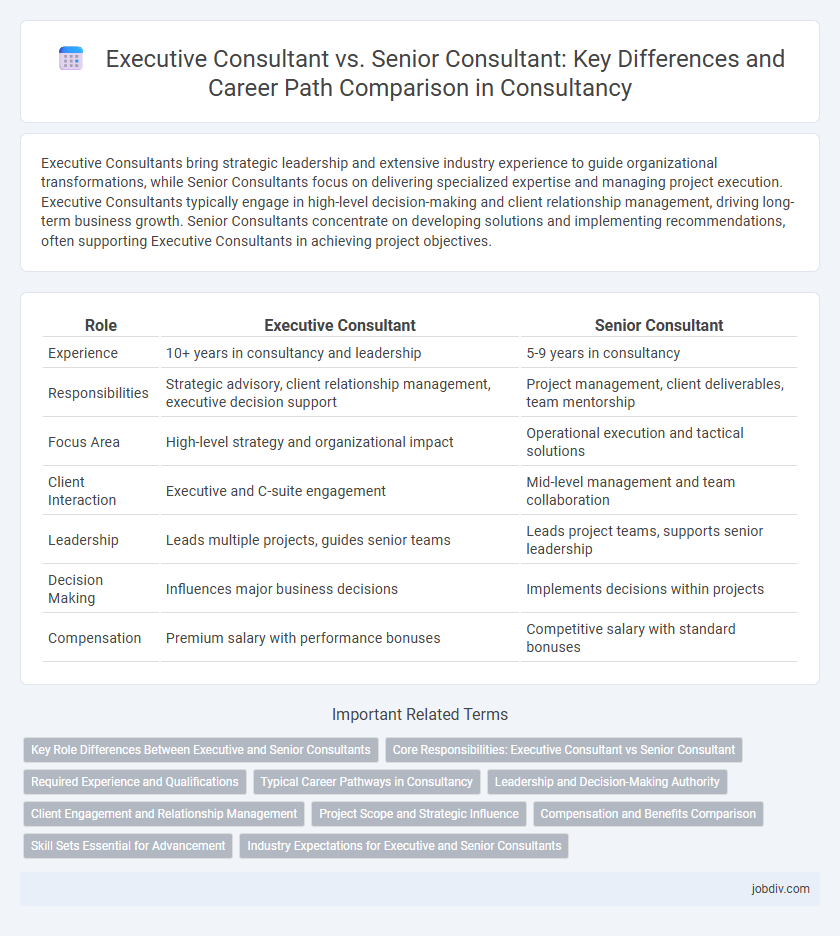Executive Consultants bring strategic leadership and extensive industry experience to guide organizational transformations, while Senior Consultants focus on delivering specialized expertise and managing project execution. Executive Consultants typically engage in high-level decision-making and client relationship management, driving long-term business growth. Senior Consultants concentrate on developing solutions and implementing recommendations, often supporting Executive Consultants in achieving project objectives.
Table of Comparison
| Role | Executive Consultant | Senior Consultant |
|---|---|---|
| Experience | 10+ years in consultancy and leadership | 5-9 years in consultancy |
| Responsibilities | Strategic advisory, client relationship management, executive decision support | Project management, client deliverables, team mentorship |
| Focus Area | High-level strategy and organizational impact | Operational execution and tactical solutions |
| Client Interaction | Executive and C-suite engagement | Mid-level management and team collaboration |
| Leadership | Leads multiple projects, guides senior teams | Leads project teams, supports senior leadership |
| Decision Making | Influences major business decisions | Implements decisions within projects |
| Compensation | Premium salary with performance bonuses | Competitive salary with standard bonuses |
Key Role Differences Between Executive and Senior Consultants
Executive Consultants primarily focus on strategic decision-making and client relationship management, leveraging extensive industry experience to drive high-level business outcomes. Senior Consultants concentrate on project execution, detailed analysis, and delivering actionable insights, often serving as the bridge between junior staff and executive leadership. The key differentiation lies in the Executive Consultant's emphasis on vision and influence, while Senior Consultants specialize in operational excellence and technical expertise.
Core Responsibilities: Executive Consultant vs Senior Consultant
Executive Consultants lead high-impact projects, providing strategic guidance and driving business transformation with a focus on stakeholder engagement and organizational change management. Senior Consultants deliver specialized expertise, conduct in-depth analyses, and support client teams in implementing solutions while managing project deliverables and timelines. Both roles require strong problem-solving skills but differ in scope, with Executive Consultants overseeing broader business outcomes and Senior Consultants concentrating on technical execution.
Required Experience and Qualifications
Executive Consultants typically require over 10 years of industry experience, demonstrating leadership in strategic projects and profound expertise in their domain. Senior Consultants usually possess 5 to 8 years of experience, showcasing strong analytical skills and project management capabilities. Both roles demand advanced degrees, with Executive Consultants often holding MBAs or specialized certifications to support high-level client advisory functions.
Typical Career Pathways in Consultancy
Executive Consultants typically have over 10 years of industry experience and lead large client projects or strategic initiatives, while Senior Consultants usually possess 4 to 7 years of experience focusing on project execution and team collaboration. The career pathway often progresses from Analyst or Consultant to Senior Consultant, then advancing to Executive Consultant roles as leadership and specialist expertise develop. Mastery in client management, industry-specific knowledge, and strategic thinking are key competencies that distinguish Executive Consultants in consultancy career trajectories.
Leadership and Decision-Making Authority
Executive Consultants hold higher leadership responsibilities, often guiding overall project strategy and managing client relationships at the executive level. Senior Consultants focus on delivering specialized expertise and supporting decision-making processes within project teams, with limited authority over broader business strategies. The Executive Consultant's decision-making authority typically extends to company-wide impact, while Senior Consultants influence specific project outcomes.
Client Engagement and Relationship Management
Executive Consultants lead complex client engagements by developing strategic solutions and fostering long-term partnerships, demonstrating expertise in high-level relationship management. Senior Consultants manage day-to-day client interactions, ensuring project milestones align with client expectations and maintaining consistent communication to build trust. Both roles prioritize client satisfaction, but Executive Consultants emphasize strategic influence while Senior Consultants focus on operational delivery.
Project Scope and Strategic Influence
Executive Consultants typically oversee broader project scopes, guiding high-level strategic initiatives and influencing organizational decision-making at the executive tier. Senior Consultants manage more focused project components, executing strategies within defined parameters and advising on tactical improvements. The Executive Consultant's role emphasizes long-term impact and cross-functional alignment, while the Senior Consultant concentrates on operational effectiveness and specific deliverables.
Compensation and Benefits Comparison
Executive Consultants typically earn higher compensation packages than Senior Consultants, reflecting their strategic influence and decision-making responsibilities within organizations. Executive Consultants often receive comprehensive benefits, including performance bonuses, stock options, and enhanced retirement plans, which surpass the standard offerings available to Senior Consultants. Salary benchmarks indicate that Executive Consultants' median pay can exceed Senior Consultants' by up to 40%, driven by elevated expertise and leadership roles.
Skill Sets Essential for Advancement
Executive Consultants demonstrate advanced strategic thinking, leadership, and client management skills, essential for driving organizational change and delivering high-impact solutions. Senior Consultants excel in analytical problem-solving, project execution, and technical expertise, providing critical support to client engagements and team collaboration. Mastery of cross-functional communication and business development acumen distinguishes Executive Consultants as key contributors to firm growth and client retention.
Industry Expectations for Executive and Senior Consultants
Executive Consultants are expected to demonstrate strategic leadership and influence at the organizational level, driving complex projects with a broad impact across industries such as finance, healthcare, and technology. Senior Consultants focus on delivering expert advice and managing project teams, exhibiting deep technical knowledge and client engagement within specialized sectors like manufacturing or energy. Industry expectations emphasize Executive Consultants to cultivate C-suite relationships and shape business transformation, while Senior Consultants are valued for their problem-solving skills and operational excellence.
Executive Consultant vs Senior Consultant Infographic

 jobdiv.com
jobdiv.com